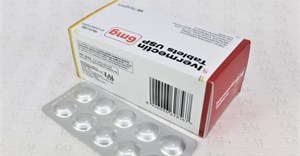Trending
Veterinary expert weighs in on Ivermectin debate

The compassionate use of ivermectin approved by the South African Health Products Regulatory Authority (Sahpra) is still limited to “only quality-assured ivermectin products intended for human use will be made accessible, and these will be controlled as prescription-only Schedule 3 medicines.”
How the drug works
Ivermectin has been used for a number of years in the veterinary and medical fields, for the treatment of parasites. The drug is generally considered safe and effective at the prescribed dosage. However, an overdose can cause severe side effects, such as paralysis in dogs. Various formulations are available for use in animals, from oral solutions to long-acting injectables. In people, it is generally used orally, for example in Merck’s Stromectol, although intravenous use of specific formulations has been recorded. Oral and other injectable formulations can be extremely dangerous if injected intravenously incorrectly/accidentally). So, does this mean that any of these formulations containing the active ingredient ivermectin will be equally effective?
The answer is unfortunately no, as the formulation plays as much of a role in eventual efficacy as the active ingredient.
To understand the impact of the formulation, one needs to first look at the processes involved in drug development. The first step for most drugs is to test the activity of the active ingredient in the laboratory.
In vitro studies
Let's start with the study that indicated that the drug can be effective in reducing the replication of SARSCoV-2 in the laboratory. In this laboratory study, cell cultures infected with the coronavirus were treated with Ivermectin at roughly 1.7ug/ml for 48 hours. Under these conditions, the drug was effective in reducing the viral loads. This suggested that that the drug would be effective. However, in the pharmaceutical world, there is the saying that in vitro activity does not indicate in vivo efficacy i.e. what works in the lab may not work in the person or animal. Some of the reasons for this might include:
- The active ingredients need to get into the body through a process of absorption. This is a complex process as the gastrointestinal tract has various obstacles that stand in the way of a drug being absorbed. In the case of ivermectin, special pumps (think of them as natural bilge pumps) keep the drug outside the body. While active ingredients are usually mixed with a number of chemicals to overcome these obstacles, in some cases, as in the pumps, very little can be done to stop this effect safely. At this stage we have no proof that the veterinary ivermectin formulation is properly absorbed when taken orally in people.
- The next obstacle is the body itself. The chemicals are foreign to the body and are broken down, predominantly in the liver. This is known as the half-life of the drug and represents half the time a drug spends in the body. Ivermectin has a half-life of about 12 hours in people, and is out of the body by the third or fourth day after the administration of one dose.
- Once the drug gets into the blood, it needs to get into the tissues where it has to work. There are also various factors which can influence the concentration, such as the amount of blood the specific organ or tissue receives.
After a single dose of Stromectol, the maximum concentration found in the plasma was around 46.6 ng/ml.
- The active ingredient also needs to reach sufficient levels for a sufficiently long enough time to be effective. From the lab study, the effective concentration against the virus was 1700 ng/ml which was maintained for 48 hours.
Based on this information, it is very unlikely that Ivermectin would be effective in a person. When one looks at the medical tablets registered by the US Food and Drug Administration (FDA), the maximum concentration that Ivermectin reached in the blood was 46.6 ng/ml at a dose of 12 mg, which is 40 to 70 times lower than what the laboratory test indicated as being effective against the virus. While the tissue concentration reached was somewhat higher, it is predicated to reach only 1/20 of the needed concentration. Furthermore, with exposure needed for 48 hours, even at a 10-fold higher dose than the 12mg, given once weekly, the drug will still fail to stay in the lungs long enough to be effective, as the liver is very efficient in removing it.
Safety
While a toxic dose is around 15mg/kg, which is substantially higher than the 12mg per person, this limit can be quickly reached if you consider the high dose needed to match the laboratory effective dose. There have also been some concerns that alcohol may make the drug more toxic, as it works on the same chemical transmitters in the brain, and there is also evidence that some fruit juices may interfere with the absorption of ivermectin.
While numerous clinical studies have indeed been undertaken on Ivermectin and its effect on Covid-19, there have been concerns around some of the studies having had a small number of patients, that some of the doctors were not properly blinded (prevented from being exposed to information that might influence them), and that they had patients on a number of different drugs. This is why when used, the patients need to be under the care of a doctor, to allow for proper patient monitoring.
While some might argue that the benefits surely outweigh the risks, this is not a true reflection of the situation and, until proper clinical studies are completed, the general public should in no way be misled into thinking that drinking the veterinary Ivermectin formulation will be a panacea in this current epidemic.















